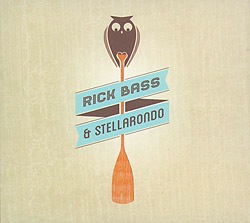
This ambitious self-titled album, the brainchild of Missoula guitarist and composer Caroline Keys and her folk orchestra Stellarondo, marries music to the words of noted Yaak author Rick Bass. It was born out of a conversation the band had on a long trip to record in Portland; when they mentioned the idea to their friend Bass, who was to write liner notes for that recording, he became intrigued, and the idea took flight.
There are three short stories and one essay here, featuring Stellarondo members Keys on resonator, kalimba, banjo, and guitar; Travis Yost on double bass, snare and bass drums; Bethany Joyce on Wurlitzer, cello, and saw; and Gibson Hartwell, guitar, pedal steel, octave mandolin, and railway junk (yep). Several contribute “noise,” as well.
Bass provides the spoken words and Stellarondo makes his imaginings manifest. The author’s tales are epic journeys that continually unfold, leading us hither and yon, all the while clinging to that thread of total believability. His tightly-written tales are so visual they need no accompaniment, yet Stellarondo has given the listener a new perspective – a storyboard for the mind.
The first number, “Canoeists,” opens with the flowing sustain of an arpeggio, a waltz that relaxes into the words of Bass as it fades into the whisper of a guitar chord. Bass speaks in a rush, setting the scene of two young lovers on a canoe trip, not knowing where the day will take them. They paddle, swim, and relax in the sun, drinking in nature, “… unconcerned by notions or constraints of time, and the amount of water that had passed by … ” A soft cello and guitar line ushers the piece into the evening.
“The Windy Day” starts softly and introspectively; it finds Bass anticipating fatherhood. Unexpectedly, a nearby forest fire interrupts a planned hospital appointment with his wife. Chunks of chords and noise roil uncertainly in the background, like a scary film score about to consume our protagonists.
“Eating” thunks in on a bent-note bass line, inviting us on a quirky journey into the woods of North Carolina. On a first date, underlain by soft pedal steel strains, a couple picks up a hitchhiking owl (yes); this scene segues into Bass’s description of a restaurant, while claps of bluesy snare drum and silky cello waft in the background.
“The Bear” begins with what could be the prelude to a k.d. lang song, with it’s cool ’60s country-soft, pedal-steel backdrop. Helen is a dying old woman, isolated in the woods, whose only companion is a huge black bear that frequents her surroundings; she feeds it and dreams about it.
We hear quiet musical tones, hardly audible. Enter tingly, whispery guitar strains that morph into the slowly rumbling train sound of a double-bass, rising up, as Bass declaims, “the bear … appeared so gradually, so slowly, blackness appearing from out of blackness … moving so carefully, so stealthily, as to seem like a man in a costume of a bear … ”
This is but a smattering of the musical wordplay going on during this unique contribution to the spoken-word genre. Visit stellarondo.com for more information.
– Mariss McTucker